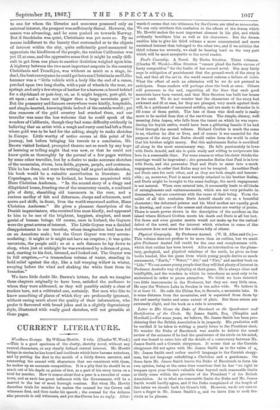Paul's Courtship. A Novel. By Hesba Stratton. Three volumes.
(Charles W. Wood.)—Miss Stratton "cannot plead the feeble excuse of hasty composition" for the faults of her second noveL She may fairly urge in mitigation of punishment that the ground-work of the story is
bad, and that all the art in the world cannot redeem a failure al) initio.
What the effect of such an admission will be we do not pretend to anticipate. Some readers will perhaps close the book at once. Others.
will persevere to the end, regretting all the time that such good materials have been wasted, and that Miss Stratton has built her house on the sand. We do not wonder- that the characters of the story feel awkward and ill at ease, for they are plunged, very much against their will, in a quicksand of unnatural artifice, and are made to flounder in it till some of them perish. The fate of those who died early is really more to be envied than that of the survivors. The simple, clumsy, well meaning John Aspen, who falls from the turret on which he was repro- ducing his boyish antics, would have been a gibbering lunatic if he had lived through the second volume. Richard Crofton is much the same
to us, whether he dies or lives, and of course it was essential for the purpose of the story that Rufus should retire from the world in order that his brother might marry. But this unfortunate Rufus is sacrificed all along in the most unnecessary way. He falls passionately in lover with Doris Arnold, and she is quite ready and willing to reciprocate his. love in a reasonable time. For some reason or other his sister thinks the marriage would be imprudent ; she persuades Rufus that Paul is in love with Doris, and she persuades Paul and Doris to enter into a mock engagement, in order that Rufus may not be tempted. As neither Paul.. nor Doris care for each other, and as they are both simple and honour- able ; as, moreover, Paul is most warmly attached to his brother Rufus,. and Doris might be brought to the same feelings, the mock engagement. is not natural. When once entered into, it necessarily leads to all kinder of entanglements and embarrassments, which are not very probable themselves, but are consistent with the cause of their being. From the- midst of all this confusion Doris Arnold stands out as a beautiful character; the deformed painter and, his blind mother aro equally good: in drawing, and some of the scenes and characters are worthy of praise.. There is much power shown in the description of the accident on the island where Richard Crofton meets his death and Doris is all but lost.. Yet these and even greater merits would not make up for the radical- defect of the novel, and the interest which attaches to some of the. characters does not atone for the tedious folly of others.






























 Previous page
Previous page